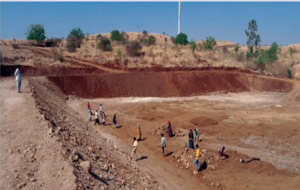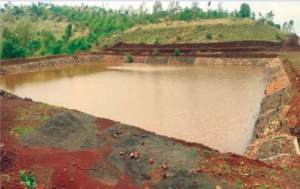The rainwater harvesting projects initiated during last year’s severe drought in Vijayapura district under the Mahatma Gandhi National Rural Employment Guarantee Act (MGNREGA) are now demonstrating excellent outcomes. Hundreds of ponds, tanks, and bunds have filled up with rainwater, providing much-needed relief to the area.
Following the declaration of the district as drought-hit, the government mandated an increase in labor-oriented projects in the affected areas to provide livelihood opportunities to the local population. Rishi Anand, CEO of the Zilla Panchayat (ZP), explained that the focus was on projects that would create jobs for locals while also aiming at rainwater conservation for the upcoming monsoon season.
“After the order, the ZP began identifying various projects, primarily aiming to employ locals in initiatives designed to conserve rainwater. The Gram Panchayats (GPs) were tasked with identifying suitable works to commence,” said Rishi Anand.
Anand highlighted that rural residents often struggle to find employment within their villages during
droughts, leading to forced migration. To combat this, the district focused solely on labor-intensive projects to provide local employment and prevent migration. With the assistance of GPs, several potential rainwater conservation projects were identified. These included the construction and desilting of farm ponds, bunds, tanks, the recharging of tubewells, and the desiltation of Amrut Sarovars.


“Under MGNREGA, we have completed work on 1,597 farm ponds, 2,137 bunds, 51 tanks, 120 Amrut Sarovars, and 196 tubewells,” Anand stated. The ZP achieved its goal of providing 42 lakh person-days of employment in the district, ensuring that laborers had access to local jobs during the drought. Anand proudly noted that these projects were completed before the onset of the monsoon. As a result, the recent good rains have filled these water bodies, which are now playing a crucial role in the district.
Such rainwater harvesting projects are particularly beneficial in drought-prone areas like Vijayapura. The filled water bodies are now available for farmers to irrigate their crops, and the percolation of water from these bodies is recharging the groundwater levels, offering long-term benefits. “Today, due to the good rains, all these water bodies are filled up, providing substantial support to the farmers and contributing to groundwater recharge,” Anand added.
The successful implementation of these rainwater harvesting projects stands as a testament to the effectiveness of targeted labor-oriented initiatives under MGNREGA in addressing both employment and environmental challenges in drought-affected regions.

